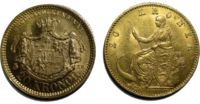
Photo from wikipedia
The outbreak of the COVID-19 pandemic has brought the global economy to a crisis: how to choose the optimal policy tools to cope with the external impacts has attracted worldwide… Click to show full abstract
The outbreak of the COVID-19 pandemic has brought the global economy to a crisis: how to choose the optimal policy tools to cope with the external impacts has attracted worldwide attention. The research evaluates the effects of China's fiscal and monetary policies in promoting economic recovery by establishing a CGE model. Five representative countermeasures such as exempting value-added tax (VAT) and cutting loan rates are studied. The results indicate that: from the aspect of fiscal policies, increasing investment shows a better effect in boosting economy compared with exempting VAT and increasing medical care expenditures; however, the policy also causes price inflation (+0.45%) and crowding-out of enterprise investment (−0.03%). From the aspect of monetary policies, providing targeted loans to enterprises has a better boosting effect on economy compared with cutting loan rates. In the choice between fiscal or monetary policies, fiscal policies exert better effects (household income, +0.95%) when taking the improvement of residents' welfare as the objective. If taking promoting recovery of enterprises and boosting the economy as objectives, monetary policies are found to be better (GDP, +1.99%). Therefore, fiscal and monetary policies should be guided by different objectives and allowed to work in a synergistic manner.
Journal Title: Frontiers in Public Health
Year Published: 2022
Link to full text (if available)
Share on Social Media: Sign Up to like & get
recommendations!